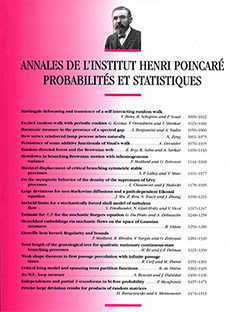Abstract
We consider the one-dimensional free Fokker–Planck equation
\[\frac{\partial \mu_{t}}{\partial t}=\frac{\partial }{\partial x}[\mu_{t}\cdot (\frac{1}{2}V'-H\mu_{t})],\] where $H$ denotes the Hilbert transform and $V$ is a particular double-well quartic potential, namely $V(x)=\frac{1}{4}x^{4}+\frac{c}{2}x^{2}$, with $c\ge -2$. We prove that the solution $(\mu_{t})_{t\ge 0}$ of this PDE converges in Wasserstein distance of any order $p\ge 1$ to the equilibrium measure $\mu_{V}$ as $t$ goes to infinity. This provides a first result of convergence for this equation in a non-convex setting. The proof involves free probability and complex analysis techniques.
On considère l’équation de Fokker–Planck libre unidimensionnelle
\[\frac{\partial \mu_{t}}{\partial t}=\frac{\partial }{\partial x}[\mu_{t}\cdot (\frac{1}{2}V'-H\mu_{t})],\] où $H$ désigne la transformée de Hilbert et $V$ est un potentiel quartique à double puits particulier, à savoir $V(x)=\frac{1}{4}x^{4}+\frac{c}{2}x^{2}$ avec $c\ge -2$. On démontre que la solution $(\mu_{t})_{t\ge 0}$ de cette EDP converge pour une distance de Wasserstein d’ordre quelconque $p\ge 1$ vers la mesure d’équilibre $\mu_{V}$ quand $t$ tend vers l’infini. Cela fournit un premier résultat de convergence pour cette équation dans un cadre non convexe. La démonstration fait intervenir les probabilités libres et l’analyse complexe.
Citation
Catherine Donati-Martin. Benjamin Groux. Mylène Maïda. "Convergence to equilibrium in the free Fokker–Planck equation with a double-well potential." Ann. Inst. H. Poincaré Probab. Statist. 54 (4) 1805 - 1818, November 2018. https://doi.org/10.1214/17-AIHP856
Information





